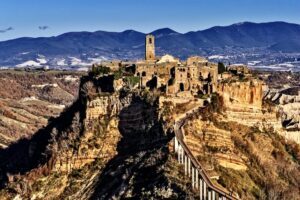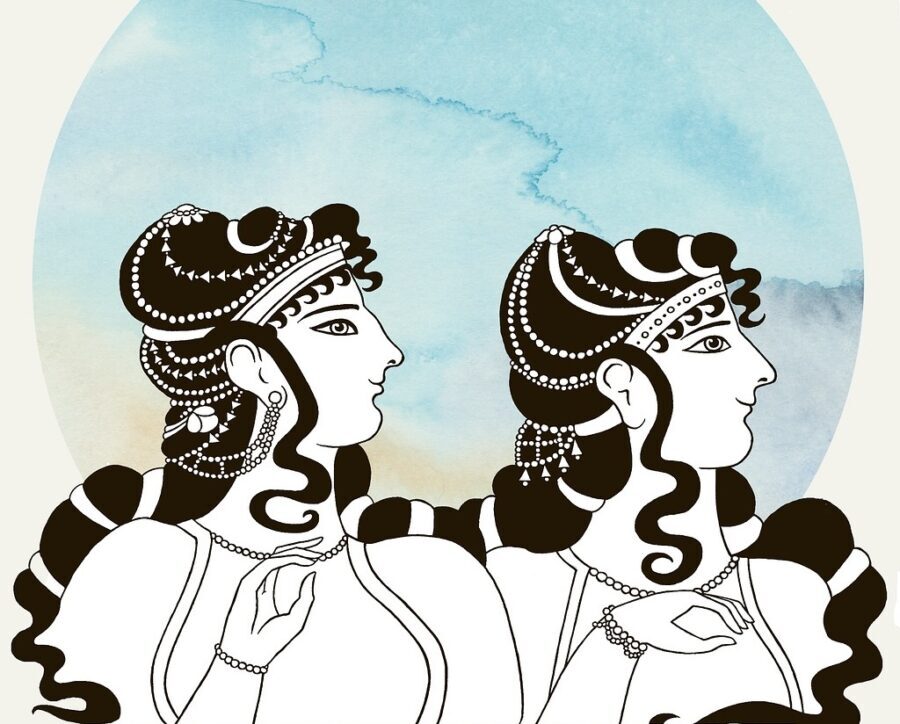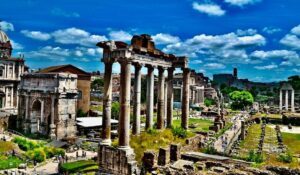
“The Forum in Rome is the most stately,
most solemn. grand , majestic, and
mournful sight conceivable.”
…Charles Dickens (1845)
Many visitors to the Forum Romanum may formulate misleading mental pictures of what daily life was like there in the glory days of the late Republic and early Empire. (First century, B.C. and A.D.) They may conjure up images of only dignified senators, consuls, judges, and other V.I.P.’s in purple-bordered togas coming and going in their conduct of government and justice. They may envision only splendid colonnaded temples set high upon marble staircases, and other handsome porticoed public buildings like the Basilica of Aemilia or the massive Tabularium (the Hall of Records) as the backdrop. Such notions fall quite short of the reality of the site, however.
While this Forum was the seat of government, it was also much more: The business, banking, and religious center, an open-air market, a marketplace of ideas. It was a popular venue for making deals of every nature. It was a clamorous hub of activity and enterprise. It was a hangout for the idle rich and the jobless poor, and every social class in between.
Surging throngs moved through the Forum from sunrise to mid-evening. The tumult and the din were beyond the power of words to describe, the medley of sights and sounds impossible to convey. One had to be there!
In front of one temple or another, smoke rose from sacrificial rites and the chanting of priests perpetually filled the air. From behind rough wooden tables, along the Via Sacra, whose paving stones remember the footsteps of Caesar, peddlers of fast-food shouted their prices and offerings. Fishmongers, having set up shop in the porticoes of various edifices, befouled the air with unpleasant and pungent odors. (Their eventual eviction was one of the earliest steps taken to improve the image of the Forum.)
Crowds of buyers and vendors of all sorts of wares jostled with lobbyists en route to their usual station in front of the Senate chamber. Street entertainers, beggars, the homeless, noisy little kids being shushed by every passing senator and retired old men looking to kill time, juvenile delinquents up to mischief, artists and con-artists, all mingled with howling cats and growling dogs. Donkeys pulling carts were, at times, bumper to bumper.
_____________________________
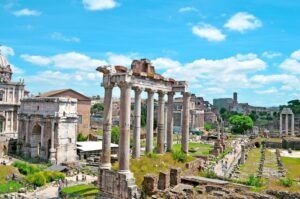
The Roman forum as it appears today. xlizziexx, Pixabay
_____________________________
There were young men – such as Julius Caesar and Marcus Tullius Cicero – studying law by clerking for prominent attorneys, patricians strutting by with their coteries of lackeys, consuls with their secret service agents, (called lictors), robed judges late for court, prosecutors and litigants, and bureaucrats on their way to political patronage jobs. There were poets of every stripe reciting their verses from makeshift platforms all the livelong day, hecklers, roustabouts, welfare recipients yelling at legislators, “Increase the dole!” There were armed troops on horseback, helpless to do much of anything toward wresting some order out of all this.
Campaigning politicians in their bleached-white togae candidae in pursuit of votes, would at certain times of the year swell the ranks of Forum habitues. The better-educated citizens liked to swarm around the news bulletins (Acta Diurna) posted on large wooden boards propped against some column or arch. Daily life in the Forum was, in short, a loosely choreographed, colorful bedlam. It was Times Square, Piccadilly Circus, and the Casbah rolled up into one.
There were crowds going one way, crowds going another; crowds stopping and obstructing movement in either direction, with all the participants exceedingly animated and obstreperous, gesticulating wildly. The lone thoroughfare, the Via Sacra, was just about impassable.
____________________________
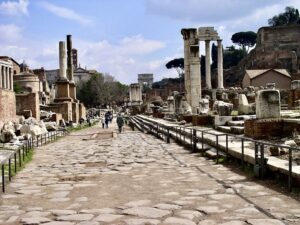
The Via Sacra as it appears today. Carla Tavares, CC BY-SA 3.0, Wikimedia Commons
____________________________
The morning hours, before the heat set in, saw the greatest concentration of people. In one speech, Cicero complained about getting shoved and elbowed along by the crunch of humanity trying to shoe-horn their way through the Arch of the Fabii at the eastern entrance. His Roman pride and dignity were particularly offended at the sight of hordes of foreigners:
“These Spaniards and Gauls walking haughtily through our Forum!”
He surely would have made note of the large numbers of Greeks, Syrians, Numidians, and Illyrians as well. Cicero would often mumble with disdain about a certain one of his political foes, a powerful crony of the dictator Sulla,
“… hovering about the Forum with his hair fancily combed and shining with unguents!”
The Forum was the scene of occasional riots and bloodshed, the staging ground for some of the capital’s most shameful disorders. Practically every society, or guild, or private interest group would inevitably organize a “March on the Forum” to air their grievances and demands. Such events could turn violent, as could some political rallies.
The historian Livy complained one day about a group of women who had marched on the Forum:
“Indeed it was with some embarrassment that
I came a few minutes ago to the Forum, right
through a throng of women. If I had not held
in respect the dignity and basic decency of each woman
as an individual (it would mortify them to be seen
receiving a scolding from a consul, say, or a
Senator), I would have said: ‘It is not right for
you to concern yourselves about which laws are
passed or repealed here.”
But Seneca in his serene stoicism saw it all through a different lens and marveled at the cosmopolitanism of the place:
“…where flow together from every corner of the globe, those induced by ambition, or by appetite for pleasure.”
By late afternoon, the inebriated would stagger in, following hours of guzzling and eating at nearby cauponae (taverns).
There were also some other unsavory characters, wanted back home by the local authorities, who poured in from the provinces to take refuge in the obscurity of the slum district of Rome, just a few minutes’ walk from the Forum.
Various ancient authors speak to us of the sundry types who lingered – or should we say “malingered” – in the precincts of the Forum. Certain groups acquired the habit of convening in the same area each day, so that in time different spots and corners were named for them. For example, members of the legal profession in need of clients loitered near the Rostra (the balustraded elaborate speakers’ platform). A large clague of idlers met near the Sun Dial. Jewelers and makers of musical instruments set up shop along the Via Sacra. Other sources inform us that perfume sellers were generally found at the southern end. Book publishers conducted business in the Argiletum, the wide street that entered the Forum to the side of the Basilica Aemilia. This section was plagued by pickpockets. At dusk the petty thieves could be spotted there divvying up the day’s take. Fortune-tellers were all over the place.
______________________________
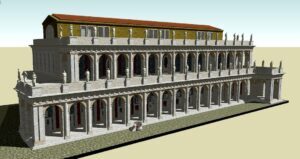
3-D reconstruction of the Basilica Aemilia as it would have appeared in its day. L.VII.C, CC BY-SA 3.0, Wikimedia Commons
______________________________
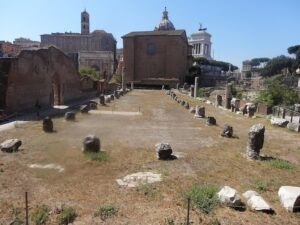
The Basilica Aemilia as it appears today. Jordiferrer, CC BY-SA 4.0, Wikimedia Commons
______________________________
At any rate, it was through such unbridled mayhem that senators, magistrates, and other officials had to pick their way to the Curia (Senate building), or to the Basilica (courthouse), or to the Tabularium (Hall of Records), often to a soundtrack of sibilant hisses and jeers from the cynical populace, many of whom were on the dole.
It wasn’t until daylight began to lose itself in the west, that the crowds would disperse and go quickly home, for the streets of Rome were no place to be after dark, what with muggers, rapists, and other malefactors on the prowl.
Juvenal, in one of his satires, has something to say about it:
“Consider the dangers of a Roman night. Chipped ceramic dishes, tossed from a rooftop, that might shatter on your head. Danger in every window you pass under. You can only hope that the resident may be content to pour down the contents of a slop-pail. A rickety horse-drawn wagon whose axle breaks, spilling its load of marble on the pavement, gangs of bullies with malice in mind, a dead body to step over. Such is the privilege of the poor bloke who, having been assaulted, prays to get home with a few teeth left in his mouth. You would be foolish to go out to dinner if you haven’t yet made out your will.”
As far back as the second century before Christ, Plautus the playwright, in one of his dramas, offered a virtual guide on where to find whom: “Monstrabo quo quemque hominem facile inveniatis loco.” (I’ll show you where you can track-down men of every type.)
“Qui mendacem et goriosum apud Cloacinae Veneris sacrum.” (Who would like a liar or a pedantic, check out the shrine of Venus Cloacina.)
“Qui periurum convenire volt hominem ito in Comitium.” (If you hope to meet up with a perjurer, go over to the Comitium.)
“In medio propter canalem, ibi ostentores meri.” (Around the middle section, near the pond, are those who put on airs, showoffs.)
“Sub veteribus ibi sunt qui dant quique accipiunt faenore.” (Down by the old shops are the loansharks.)
“Pone aedem Castoris, ibi sunt subito quibus credas male.” (Behind the Temple of Castor are the swindlers. Do not trust them.)
“Confidentes garrulique et malevoli supra lacum, qui alteri de nihilo audacter dicunt contumeliam.” (Beyond the pond are those cocky and garrulous wiseguys who gratuitously harass others with insults.)
“Ditis damnos maritos sub basilica quaerito ibidem erunt scorta exoleta.” (You will find the rich, derelict husbands at the base of the basilica, where there will be waiting mature ‘escorts.’)
A century later, the satirist Gaius Luciliuis, whom Horace credits as the originator of that genre of literature, echoes Plautus’ sentiments with this:
“Nunc vero a mani ad noctem, festo atque profesto, totus item pariterque die populusque iactare indu foro se omnes, decedere nusquam; uni se atque eidem studio omnes dedere et artiverba dare ut caute possint, pugnare dolose, blanditia certare, bonum silulare virum se, insidias facere ut si hostes sint omnibus omnes.” (Now truly from morning to night, holiday or not, the commoners and the elite descend on the Forum with no plans for ever leaving. They pull the same stunts on one another, and fight like cats and dogs then make nice in an effort to seem reputable, while at the same time they continue to plot against their own kind like irreconcilable foes.)
Such were the day-to-day activities in the great Forum Romanum, with some exceptions. On days of special events, such as the inauguration of the newly elected consuls, or a sacrosanct ritual of the Vestal Virgins, or a triumphal parade honoring victorious legions with their spoils of combat and their pitiful prisoners-of-war in tow, or any other highly ceremonial celebration, perhaps, for example, an official state visit by the diplomatic corps representing all the provinces and allies—for such occasions, the authorities would see to it that a sanitized version of the Forum was presented. On the days leading up to such hoopla, a company of elite Roman troops would make a clean sweep of it, rousting and ousting all the unwanted dramatis personae. This would be followed by a squad of street cleaners ridding this hallowed ground of all the accumulated debris. The following day the usual suspects would flock back to the Forum and renew the madcap circus ambience, amid the architectural splendor of the place.
That splendor of the majestic rectangle (540 yards by 270) would be heartlessly ravaged by the invading barbarians of the early Middle Ages, who reduced the old marketplace into today’s ruin-strewn graveyard. Sic transit gloria mundi—thus passes the glory of the world.


